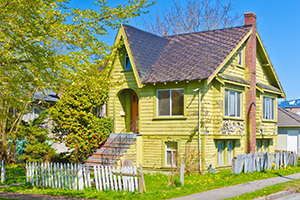
If you enjoy shopping clearance sales, you might love the foreclosure market.
Having a tough time finding a traditionally sold home? You may want to consider buying a distressed home. Housing inventory has declined slightly, but take heed: many cities and counties are slowly working through their backlog of foreclosure and short-sale proceedings. That means you may have a decent chance of finding an REO (bank-owned) property.
But before you start sifting through REOs, pause and ask yourself: Do you really want to own a foreclosure? Here are some of the pros and cons of owning a foreclosed house.
PROS
1. Biggest selection to choose from
If you’re purchasing your primary residence, you’ll have the first pick of the housing inventory. After the property hits the market, only owner-occupants and nonprofits can make offers during the first 14 days. Investors must hold their bids on the property until day 15.
2. Lower prices
Typically, foreclosed homes are sold for lower prices than traditionally sold homes. The discount varies by property: A higher-end foreclosed home in great condition may sell for only a slight discount, whereas a fixer-upper may offer a deeper sale.
3. Less competition
Because of the drawbacks of buying foreclosures (described below), fewer other owner-occupants are placing bids. That means you’ll compete against a smaller buyers market.
4. Instant appreciation
There’s a strong likelihood that you’ll gain instant appreciation on your home from day one since you’re buying at a discount (relative to similar homes on the market).
CONS
1. Living requirements
For that jump you get on making an owner-occupant offer during those first 14 days, most banks will require you to live in the home for a particular length of time (typically one year). You may also be obligated to move in within 30 to 60 days of closing and not sell or assign the house during that first year.
2. Area appreciation slowed by foreclosures
If the surrounding neighborhood features many other foreclosed properties, the overall area might appreciate more slowly, thanks to its lower-priced inventory. While you may experience a hit of “instant appreciation,” be prepared to see slow growth in the next few years.
3. Crime and blight
If many foreclosed homes are concentrated in a neighborhood, there’s a chance the area will experience more crime, overgrowth, and blight, and that the schools will have a less-stable student population. Safety and theft may be a concern; you might want to consider adding a home security system or installing a cage around the air-conditioning unit.
4. Damage
Unfortunately, the former owners may have decided to trash the home before they moved out. Foreclosed homes commonly come with damage, which can range from mild (missing appliances and general dirtiness) to severe (punching holes in the drywall to remove copper pipes).
5. Not move-in ready
Thanks to this damage, the property might not be move-in ready at the time of closing — you may need to immediately hire contractors to renovate or repair the unit. The extent will vary: At one extreme, the house might need a totally new kitchen and bath, or it may be missing all of its mechanicals, like a water heater and HVAC system. On the other hand, it may simply need cosmetic updates, like new carpet, before you can move in.
6. Potential title issues
Thanks to the somewhat-complex nature of the foreclosure process, there may be some question as to who holds title to the property — the bank? The former owners? These issues can get particularly tricky if the property was part of a divorce hearing or a lease-purchase option or has some other complicated back story. A good real estate agent and closing attorney can help walk you through this process and make sure you have solid title insurance.
7. Sold as-is
In a traditional sale, the buyer and seller can negotiate over which repairs must be performed before the house is sold. The buyer, for example, can ask the seller to add insulation or replace the gutters. Foreclosed houses are sold as-is, and often also sold with no written disclosures. Hire a licensed inspector to get a good idea of the property’s condition before you close the deal.
Bottom line
If you enjoy shopping clearance sales, you might love the foreclosure market. Foreclosures offer a great opportunity to pick up a home “on sale.” But be careful: Homes on this sale rack may have scratches, tears, stains, and other problems. Conceptualize your “total purchase price” as the initial cost plus the upfront repairs, and ask yourself whether you’re ready to manage the workload.

